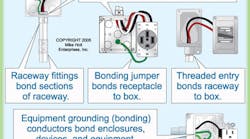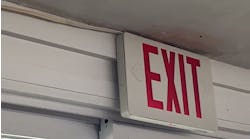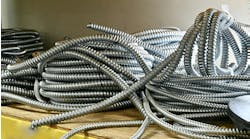Why is grounding so difficult to understand? One reason is because many do not understand the definition of many important terms. So let’s review a few important definitions contained in Articles 100 and 250.
Bonding [100]. The permanent joining of metal parts together to form an electrically conductive path that has the capacity to conduct safely any fault current likely to be imposed on it.
Author’s comment: Bonding is accomplished by the use of conductors, metallic raceways, connectors, couplings, metallic-sheathed cables with fittings, and other devices recognized for this purpose [250.118].
Bonding jumper [100]. A conductor properly sized in accordance with Article 250 that ensures electrical conductivity between metal parts of the electrical installation.
Effective ground-fault current path [250.2]. An intentionally constructed, permanent, low-impedance conductive path designed to carry fault current from the point of a ground fault on a wiring system to the electrical supply source. The effective ground-fault current path is intended to help remove dangerous voltage from a ground fault by opening the circuit overcurrent protective device.
Equipment grounding conductor [100]. The low-impedance fault-current path used to bond metal parts of electrical equipment, raceways, and enclosures to the effective ground-fault current path at service equipment or the source of a separately derived system.
Author’s comment: The purpose of the equipment grounding (bonding) conductor is to provide the low-impedance fault-current path to the electrical supply source to facilitate the operation of circuit overcurrent protection devices in order to remove dangerous ground-fault voltage on conductive parts [250.4(A)(3)]. Fault current returns to the power supply (source), not the earth! Refer to 250.118 for acceptable types of equipment grounding conductors.
Ground (Earth) [100]. Earth or a conductive body that is connected to earth.
Grounded [100]. Connected to earth.
Ground fault [100]. An unintentional connection between an ungrounded conductor and metal parts of enclosures, raceways, or equipment.
Ground-fault current path[250.2]. An electrically conductive path from a ground fault to the electrical supply source.
Author’s comment: The fault-current path of a ground fault is not to the earth! It’s to the electrical supply source, typically the XO terminal of a transformer. The difference between an “effective ground-fault current path” and “fault-current path” is that the effective ground-fault current path is “intentionally” constructed to provide the low-impedance fault-current path to the electrical supply source for the purpose of clearing the ground fault. A ground-fault current path is simply all of the available conductive paths over which fault current flows on its return to the electrical supply source during a ground fault.
Grounded (Earthed) [100]. Connected to earth.
Grounded neutral conductor [100]. The conductor that terminates to the terminal that is intentionally grounded to the earth.
Grounding (Earthing) conductor [100]. The conductor that connects equipment to the earth via a grounding electrode.
Author’s comment: An example would be the conductor used to connect equipment to a supplementary grounding electrode [250.56].
Grounding (Earthing) electrode [100]. A device that establishes an electrical connection to the earth. (See 250.50 through 250.70)
Grounding electrode (earth) conductor [100]. The conductor that connects the grounded neutral conductor at service equipment [250.24(A)], the building or structure disconnecting means enclosure [250.32(A)], or a separately derived systems enclosure [250.30(A)] to an electrode (earth).
Main bonding jumper [100]. A conductor, screw, or strap that bonds the equipment grounding (bonding) conductor at service equipment to the grounded neutral service conductor in accordance with 250.24(B). (For more details, see 250.24(A)(4), 250.28, and 408.3(C).)
Solidly grounded [100]. The intentional electrical connection of one system terminal to the equipment grounding (bonding) conductor in accordance with 250.30(A)(1).
Author’s comment: The industry calls a system that has one terminal bonded to its metal case a solidly grounded system.
System bonding jumper [100]. The conductor, screw, or strap that bonds the metal parts of a separately derived system to a system winding in accordance with 250.30(A)(1).
Author’s comment: The system bonding jumper provides the low-impedance fault-current path to the electrical supply source for the purpose of clearing the ground fault. For more information see 250.4(A)(5), 250.28, and 250.30(A)(1).
Editor’s note: This information was extracted from Mike Holt’s textbook, Understanding the National Electrical Code




